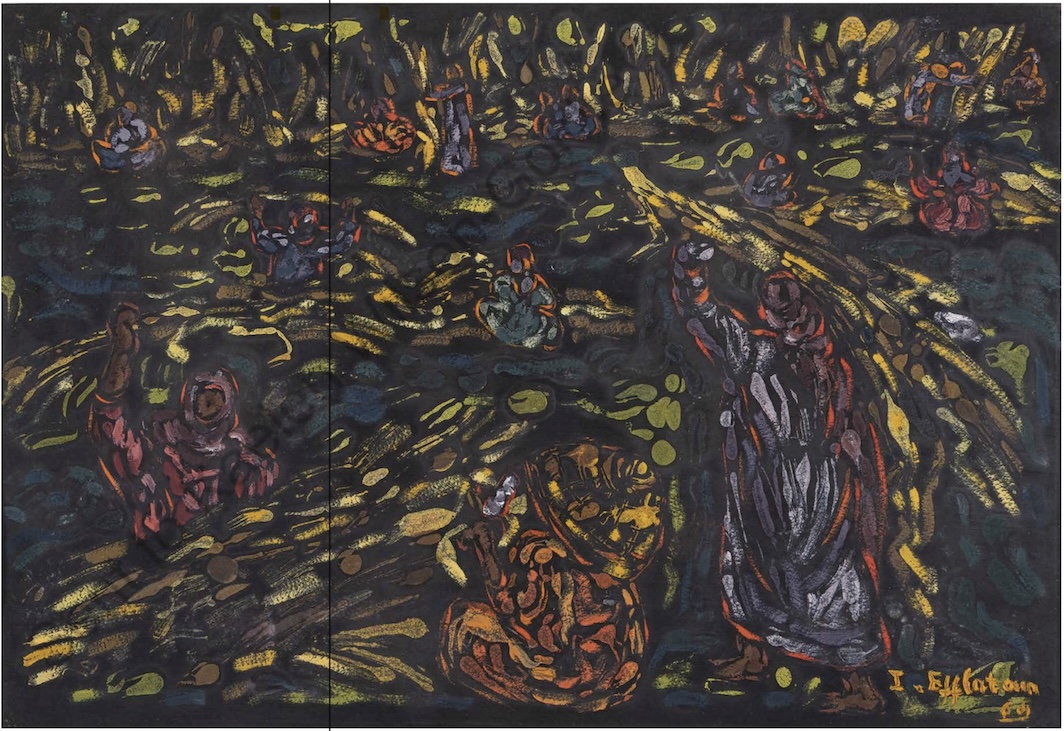
Kaelen Wilson-Goldie

FOR MOST OF HER LIFE, THE EGYPTIAN ARTIST Inji Efflatoun divided her days in half. She would paint in the morning and do politics in the afternoon—anything from attending the events of a rich and varied cultural life to plunging headlong into activist campaigns. A member of several underground communist groups, Efflatoun created at least […] As the most ambitious political forces in the Middle East seem to grow ever more messianic and apocalyptic, who, or what, is the Arab of the future? The Syrian cartoonist Riad Sattouf leaves the question hanging at the end of his Maus-like graphic memoir. The blond little boy at the center of Sattouf’s tale is, like most of the political and cultural forces shaping his life’s story, profoundly unsettled. Readers see him become charmed, bewildered, and eventually endangered by his father’s myopic enthusiasm for the pseudosecular, quasi-socialist dictatorships of Muammar Gaddafi’s Libya and Hafez al-Assad’s Syria. A TRAUMATIC EVENT is one that defies our ability to tell what happened and at the same time sets off the desperate compulsion to do so, or at least to try, over and over, however awkward, until a story begins to take hold. A sharp, sudden eruption of violence—a war, an explosion, an attack—both does damage and repairs, by triggering the impulse to explain it, assign it meaning, and make it fit within the wider story we tell ourselves about the worlds in which we live. 
Late in the fall of 1999, the renowned art historian Svetlana Alpers retired from teaching, packed up her house in California, and moved into a loft near Union Square in New York City. High above a neighborhood that had once been home to printers and lithographers, Alpers had stunning views, with six windows facing west, two windows facing east, and an eyeful of sky in either direction. Each morning, she watched a play of shadows dance along the walls of adjacent buildings as day broke and sunlight slipped across nearby roofs, water towers, and eclectic architectural details, including a decorative A Lebanese pharmacist concocts a mysterious green potion that makes him sexually irresistible to his female customers. An architect dreams all day of emigration while playing a computer game simulating the demolition of downtown Beirut. A son rescues his father’s favorite prostitute, a woman who ruined his childhood but also made him a man, from a brothel that is about to be bombed. He looks after her for the rest of her life. An eccentric old man in the port city of Tripoli claims to be the last living descendant of the Frankish invaders who led the Crusades. He applies 
The great Moroccan writer Abdellatif Laâbi was just twenty-three years old when he met the poets and painters who would help him revolutionize the worlds of art, literature, and politics across North Africa and the Middle East. It was 1965, and Morocco was poised between a once-promising independence, which it had won from France nine years earlier (only to see it diminished by the restored monarchy’s crackdown on dissent), and the “years of lead” (zaman al-rasas), which would stretch into four decades of increasingly brutal repression under the reign of King Hassan II. It was also the height of the Late in the autumn of 2014, a prominent Yemeni politician was out taking a walk near his home in the capital city of Sana’a when two men on motorbikes shot him to death. Muhammad Abdelmalik al Mutawakel was a professor of political science who had long been advocating for a strong, democratic state in an otherwise fractious, feudal place. Mutawakel was the leader of a liberal party and an architect of the uprisings that had deposed Ali Abdullah Saleh, Yemen’s autocratic former president; he had been negotiating a peace deal behind the scenes among Houthi rebels, the opposition, and the 
In February, Amnesty International published a report on the Saydnaya Military Prison in Syria that made for especially gruesome reading. The headline revelation, that the Syrian authorities killed up to thirteen thousand people in extrajudicial executions at Saydnaya between 2011 and 2015, surprised exactly no one familiar with the structure of the Syrian state or the regime of Bashar al-Assad and its long-standing use of torture. Amnesty estimates that there are now up to twenty thousand detainees in Saydnaya, virtually all of them nonviolent demonstrators who never joined the Free Syrian Army or the Islamic State or any of the